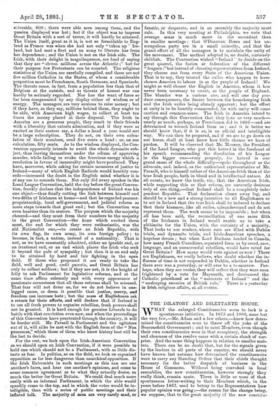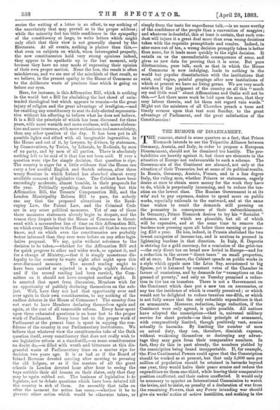THE DILATORY AND DILETTANTE HOUSE.
WHAT the enlarged Constituencies seem to lack is a spontaneous initiative. In 1879 and 1880, none but the very few,—Mr. Adam and a few others,—knew how deter- mined the constituencies were to throw off the yoke of the Beaconsfield Government ; and to most Members, even though their own constituencies were in that conspiracy, the strength and clearness of the resolve came with a certain shock of sur- prise. And the same thing happens in relation to smaller mat- ters. There can be no doubt, that, but for the signals given by the leaders in all parts of the country, we should never have known last autumn how determined the constituencies were to carry any Standing Orders that their chiefs thought necessary for the better despatch of business in the House of Commons. Without being convoked in local assemblies, the new constituencies, however strongly they really think, remain mute. There is little or none of that spontaneous letter-writing to their Members which, in the years before 1867, used to betray to the Representatives how popular opinion was going ;—the reason for the change being, we suppose, that to the great majority of the new constitu- encies the writing of a letter is an effort, to say nothing of the uncertainty that may prevail as to the proper address ; while the minority feel too little confidence in the sympathy of the constituency at large, to write letters which might only elicit that their view is not generally shared by the Electorate. At all events, nothing is plainer than this,— that even on subjects on which, when interrogated properly, the new constituencies hold very strong opinions indeed, they appear to be apathetic up to the last moment, only ,because they have no easy mode of expressing their opinion of their own proper motion. None the less, the result is often mischievous, and we see one of the mischiefs of that result, as we believe, in the present apathy in the House of Commons as to the deliberate waste of precious time which is going on before our eyes.
Here, for instance, is this Affirmation Bill, which is nothing in the world but a Bill for abolishing the last shred of unin- tended theological test which appears to remain—to the great injury of religion and the great advantage of irreligion,—and for enabling any constituency to seat its duly-elected representa- tive without his affecting to believe what he does not believe. It is a Bill the principle of which has been discussed for three years, with more warmth and more coolness, with more elabora- tion and more terseness, with more enthusiasm and more sobriety, than any other question of the day. It has been put in all possible lights and sifted with all imaginable ingenuities, in the House and out of it, by lawyers, by divines, by statesmen,
- • by Conservatives, by Tories, by Liberals, by Radicals, by men of no party, and by men of all parties. There is absolutely nothing left to be said of it that has not been said. If ever a -question were ripe for simple decision, that question is ripe. The country is eager for a little evidence that the House can -carry a few needful English and Scotch reforms, after three weary Sessions in which Ireland has absorbed almost every available moment of legislative time. The Cabinet have been exceedingly moderate, almost humble, in their proposals for the year. Politically speaking, there is nothing but this Affirmation Bill, the Tenants' Compensation Bill, and the London Municipality Reform Bill to pass, for nobody
• can say that the proposed alterations in the Bank- ruptcy Law, the Patent Law, and the Criminal Code are in any sense political measures. Yet of one of these three measures statesmen already begin to despair, and the reason they despair is that the House of Commons is threat- ened with a measureless loss of time on this Affirmation Bill, on which every Member in the House knows all that he can ever - know, and on which even the constituencies are probably -better informed than they ever were before on any other legis- lative proposal. We say, quite without reference to the -decision to be taken,—whether for the Affirmation Bill and for quick progress to other and wider work, or against it, and for a change of Ministry,—that it is simply monstrous dis- loyalty to the country to waste night after night upon this over-discussed measure. The second reading ought to have been carried or rejected in a single night's debate ; and if the second reading had been carried, the Com- mittee on it should not have occupied another night. It is asserted that apart from discussion, Members wish for an opportunity of publicly declaring themselves on the sub- ject. Well, have they not had that opportunity over and over again in their own constituencies, to say nothing of the endless debates in the House of Commons ? The country does not want to have Members declaring themselves again and again, at the cost of all reasonable reform. Every hour spent • upon these exhausted questions is an hour lost to the proper work of Parliament. Every hour lost to the proper work of Parliament at the present time is spent in sapping the con- fidence of the country in our Parliamentary institutions. We believe that whatever view the constituencies take of the Oath question itself, every constituency that does not really wish to see legislative reform at a stand-still,—as some constituencies no doubt do,—is filled with wrath and bitterness at this dis- graceful waste of Parliamentary time on a matter ripe for
decision two years ago. It is as bad as if the Board of•Inland Revenue devoted meeting after meeting to perusing
the old ledgers, or as if the masters of all the great schools in London devoted hour after hour to seeing the boys scribble their old lessons on their slates, only that they may be again rubbed out. The business of legislation b to legislate, not to debate questions which have been debated till the country is sick of them. An assembly that talks on after the moment for action has come,—whether it be to prevent other action which would be otherwise taken, or simply from the taste for superfluous talk,—is no more worthy of the confidence of the people than a convention of magpies ; and whatever is doubtful, this at least is certain, that such con- duct will injure it a great deal more than even wrong decisions taken with the requisite promptitude and resolve. Indeed, in nine cases out of ten, a wrong decision promptly taken is better than none, for it leads more quickly to the right decision. It entails on us the uncomfortable consequences of error, and gives us new data for proving that it is error. But pure dilettanteism, pure talk, such as that in which the House of Commons is now indulging, leads to nothing in the world but popular dissatisfaction with the institutions that exist, and vague, painful gropinga after new institutions of which at present we have no living germs. We are very much mistaken if the judgment of the country on all this "much cry and little wool" about Affirmations and Oaths will not be this,—" Let there more work be laid upon the men, that they may labour therein, and let them not regard vain words." Might not the ministers of all Churches preach a terse and timely sermon upon that text next Sunday, to the great advantage of Parliament, and the great satisfaction of the Constituencies?



































 Previous page
Previous page